We ran a benchmark on the iPad Pro (2024), which is equipped with the M4 chip and has significantly improved performance from the previous generation.

iPad Pro - Apple (Japan)
https://www.apple.com/jp/ipad-pro/
The iPad Pros that arrived at the GIGAZINE editorial department this time are the 11-inch 1TB Wi-Fi model (silver) and the 13-inch 256GB Wi-Fi + Cellular model (space black). You can see how to open both models by reading the article below.
'The thinnest Apple product ever' M4-equipped iPad Pro 11-inch model & 13-inch model opening ceremony & appearance review - GIGAZINE

Looking at the iPad Pro specifications published on Apple's official website, the 11-inch and 13-inch models have the same display size, but the 256GB/512GB and 1TB/2TB storage models have slightly different M4 processor specifications. The 256GB/512GB storage model has a 9-core M4 CPU (3 high-performance cores + 6 high-efficiency cores), while the 1TB/2TB storage model has a 10-core M4 CPU (4 high-performance cores + 6 high-efficiency cores). The RAM capacity also differs, with the 256GB/512GB storage model having 8GB and the 1TB/2TB storage model having 16GB.
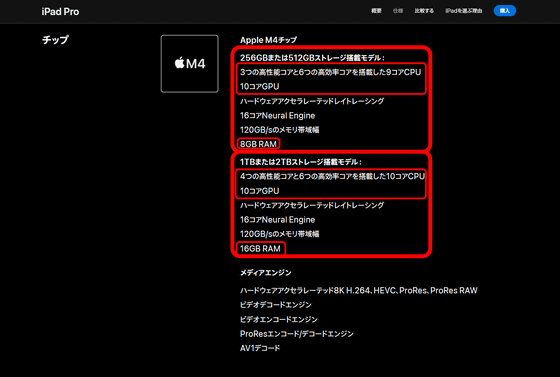
◆Check the bezel width
After opening the box, I turned it on, registered my Apple ID, and set it up to be usable. Before running the benchmark, I measured the width of the black bezel surrounding the screen.
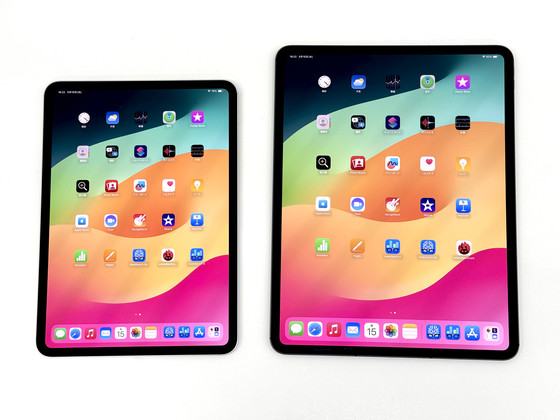
On the 11-inch model, the bezel width was measured at approximately 8mm.
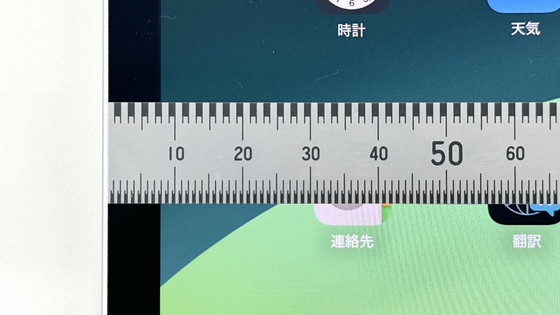
The vertical width of the bezel was approximately 8 mm.
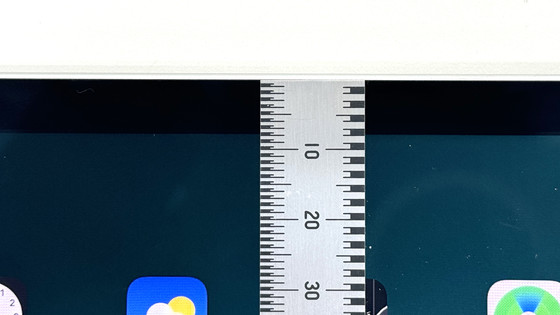
The bezel width of the 13-inch model is approximately 8mm.
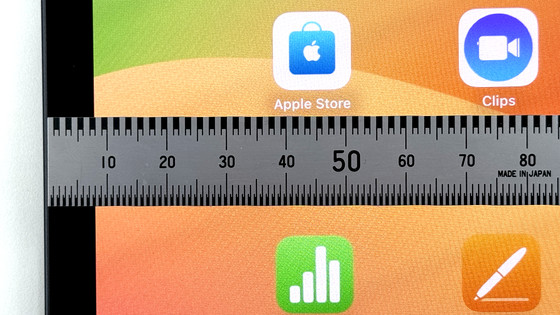
The vertical width of the bezel was also approximately 8mm.
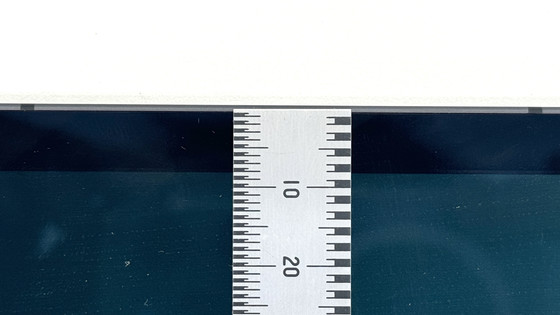
The M4-equipped iPad Pro is billed as 'the thinnest Apple product ever,' measuring just 5.3mm thick for the 11-inch model and 5.1mm thick for the 13-inch model. While the device is slightly larger than the previous-generation iPad Pro, it's only 1.0mm tall and 0.6mm wide, so there's practically no difference. In fact, it's lighter, so much so that our editorial staff who actually picked it up couldn't help but exclaim, 'It's so thin! So light!' While the device is thin, it's incredibly sturdy and durable, so you won't have to worry about it bending while holding it.

◆Tandem OLED display
The iPad Pro (2024) with the M4 is the first iPad to feature an OLED (organic light-emitting diode) display. OLED displays differ from LCD (liquid crystal display) displays, which combine a backlight and liquid crystal display, in that the pixels are self-illuminating. Therefore, while LCD displays tend to allow the backlight to shine through in the black areas of the screen, making them appear slightly washed out, OLED displays black areas in a truly black state.
The following image shows the same movie played on a 12.9-inch iPad Pro (2018) with LCD display and a 13-inch iPad Pro (2024) with the display brightness set to maximum. Looking at the black bars at the top and bottom, you can clearly see that the iPad Pro (2018) has a slightly white background due to backlight leakage, while the iPad Pro (2024) is completely black. The brightness of the display itself is also comparable, and there were moments when the iPad Pro (2024) seemed brighter and more colorful.
◆iPad Pro 11-inch 1TB Wi-Fi model
I ran the benchmark using Geekbench 6. The room temperature was 22 degrees, the humidity was 50%, and the Geekbench version was 6.3.
・CPU benchmark
Below are the CPU benchmark results for the 11-inch 1TB Wi-Fi model. The single-core score was 3,736 points, and the multi-core score was 14,667 points. Looking at the 'CPU Information' section, the CPU is listed as 4 cores + 6 cores = 10 cores, and the memory is listed as 15.1GB.
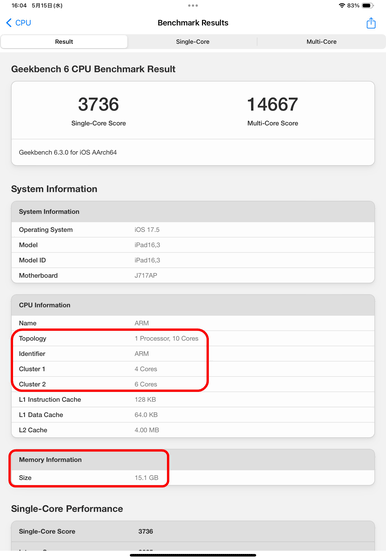
The breakdown of single-core performance looks like this:
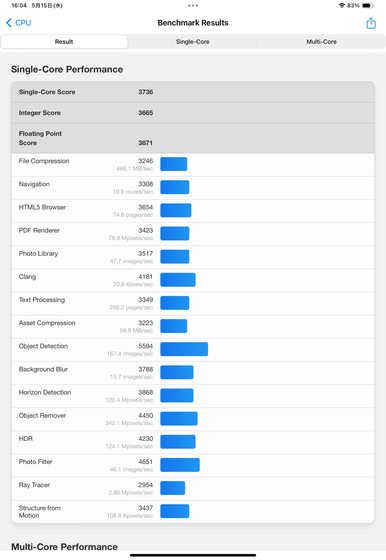
And here's the breakdown of multi-core performance:
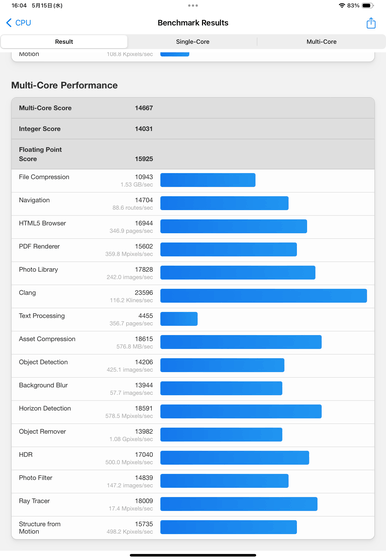
When compared to the single-core performance of Apple devices collected in the Geekbench database, the M4-equipped iPad Pro scored 3736 points, while the previous-generation M2-equipped iPad Pro (11-inch, 4th generation) scored 2534 points, and the M1-equipped iPad Pro (11-inch, 3rd generation) scored 2265 points. In terms of performance scores alone, this represents a nearly 50% improvement from the previous generation.
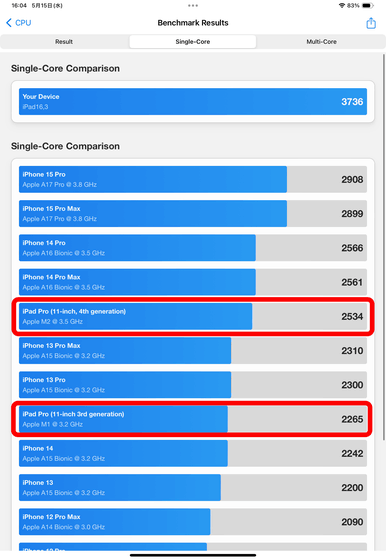
Comparing multi-core performance, the iPad Pro with M4 scored 14,667 points, while the previous generation iPad Pro with M2 (11-inch, 4th generation) scored 9,622 points and the iPad Pro with M1 (11-inch, 3rd generation) scored 8,160 points.
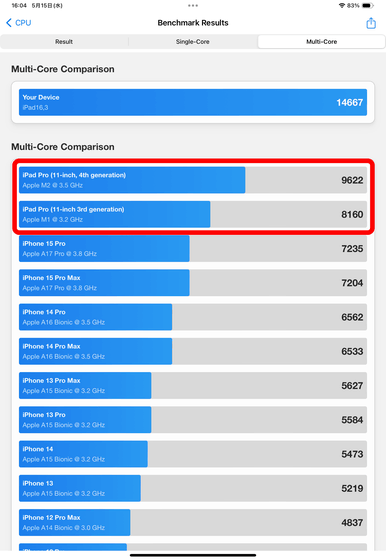
・GPU benchmark
The GPU performance score was 53,211 points.
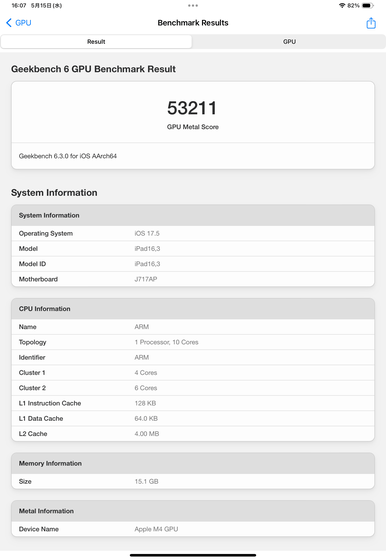
Below is a breakdown of the performance of
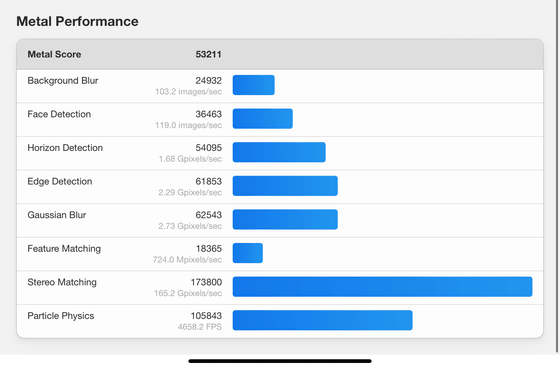
The iPad Pro with M4 scored 53,211 points, while the previous generation iPad Pro with M2 (11-inch, 4th generation) scored 45,135 points, and the iPad Pro with M1 (11-inch, 3rd generation) scored 32,105 points. In terms of performance score, it's an improvement of more than 17% from the previous generation iPad Pro.
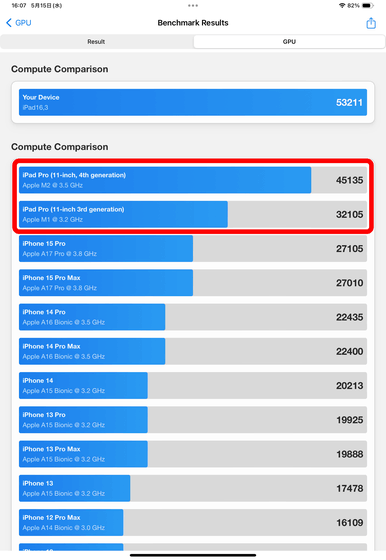
・AI performance
We ran the Neural Engine benchmark on
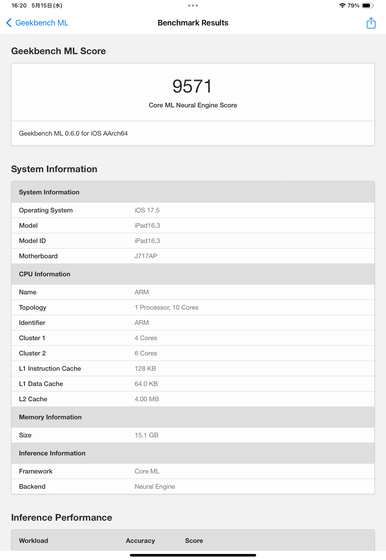
Here's a breakdown of the Geekbench ML performance:
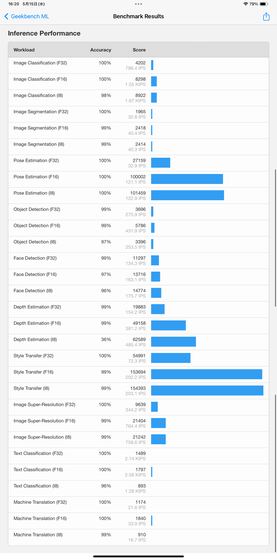
We also tested the performance score on

The performance score items are as follows:
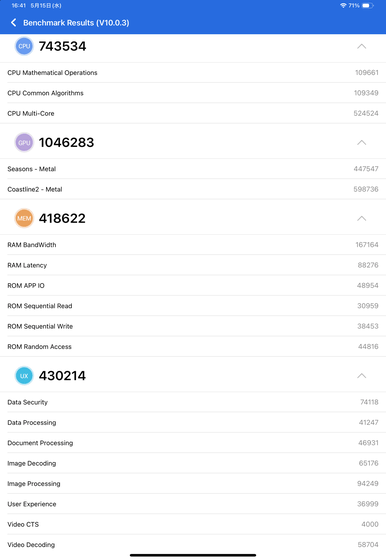
Looking at the rankings as of April 2024, the previous generation M2-equipped iPad Pro 12.9-inch model scored 2,133,398 points, and the 11-inch model scored 1,943,780 points, which is a score increase of more than 20% compared to the previous generation.
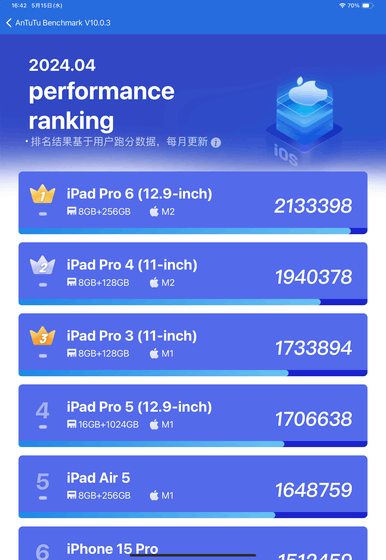
◆iPad Pro 13-inch 256GB Wi-Fi + Cellular model
The 13-inch model's CPU performance score in Geekbench 6 was 3,761 points for single-core and 13,282 points for multi-core. With 256GB of storage, the CPU has 3 cores + 6 cores = 9 cores, and 7.20GB of memory. While the single-core score is nearly the same as the 11-inch 1TB model, the multi-core performance score is slightly lower compared to the 11-inch 1TB model due to the reduced number of CPU cores.
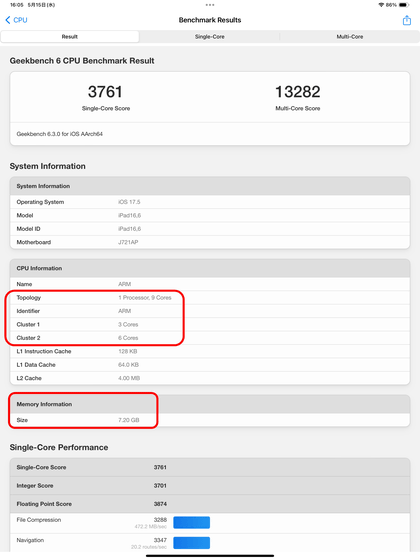
The single-core performance breakdown is as follows:
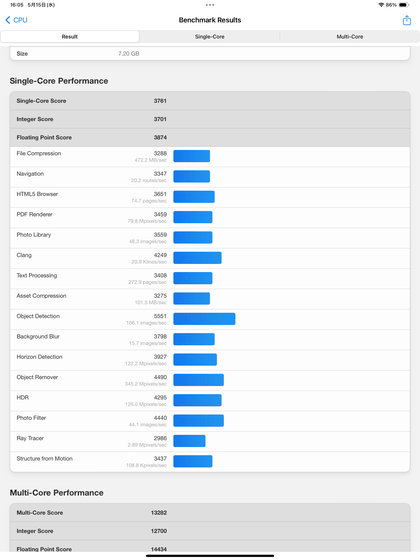
Here's a breakdown of the multi-core performance:
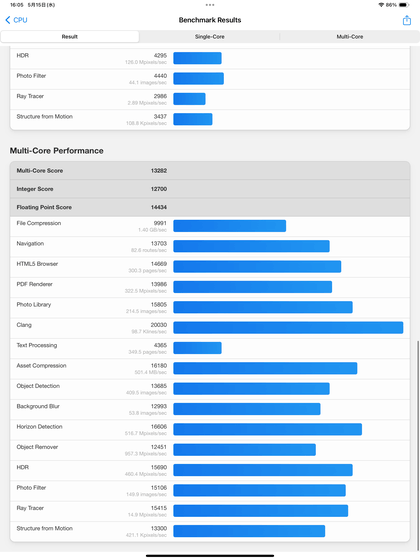
The GPU performance score was 54,087 points, almost the same as the 11-inch 1TB model.
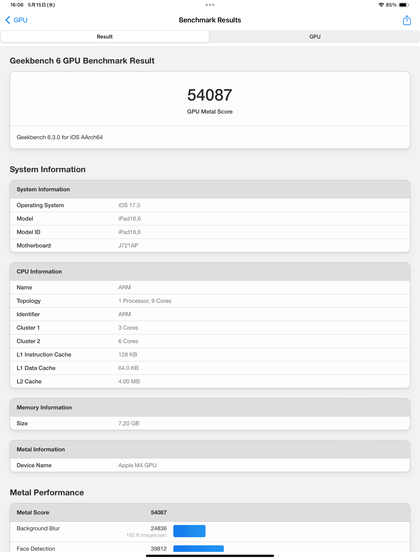
Here's a breakdown of Metal's performance:
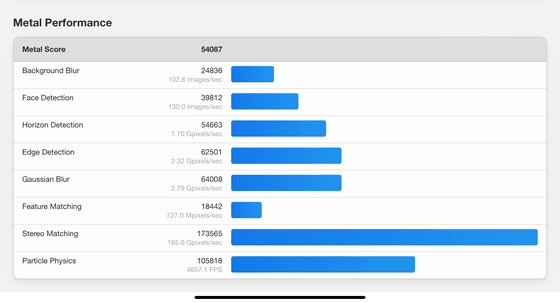
The score for the Geekbench ML Neural Engine benchmark was 9570 points.
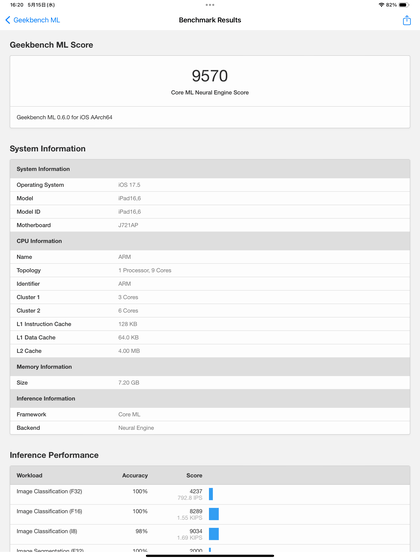
The breakdown of the results looks like this:
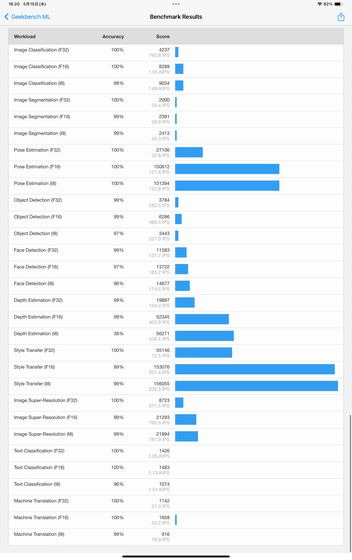
The Antutu Benchmark score was 2,667,588 points, almost the same as the 11-inch 1TB model.

The breakdown of the benchmark results was as follows:
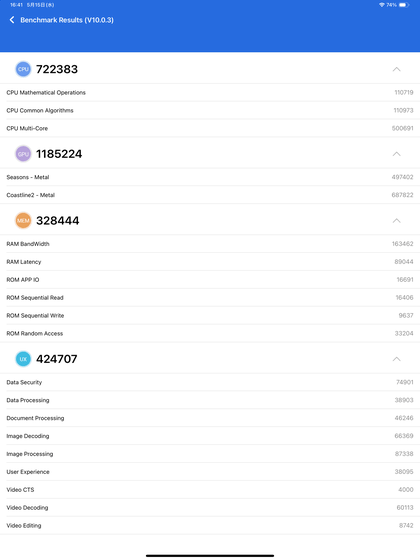

Related Posts:







